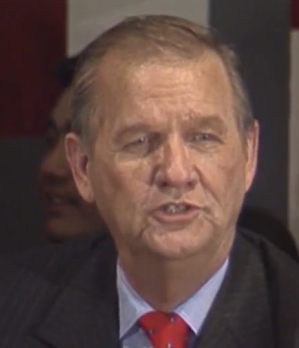![635547026372441890-Bob-Lainer2[ID=20709089] ID=20709089](http://www.gannett-cdn.com/-mm-/b415eedb7c4acafb7c7daf5f8e66b51c73fa3920/c=0-42-298-266&r=115x86/local/-/media/2014/12/20/KHOU/KHOU/635547026372441890-Bob-Lainer2.png) Bob Lanier, the political kingmaker who shambled out of smoke-filled rooms to become one of Houston's most popular and powerful mayors, died on Saturday. He was 89 years old.
Bob Lanier, the political kingmaker who shambled out of smoke-filled rooms to become one of Houston's most popular and powerful mayors, died on Saturday. He was 89 years old.
Word of the former mayor's death, which spread quickly through Houston politics late Saturday afternoon, was confirmed by associates of the Lanier family. The cause of death was not immediately released.
Lanier served as Houston's mayor from 1992 to 1998, riding into office on a promise to put more police on the streets, abandon a Metro monorail plan and divert transit funds into paving roads and sidewalks. His broad popularity cut across ethnic and party divides, electing him to three terms in office. And if he hadn't been the city's first term-limited mayor, he almost certainly would have been re-elected into the 21st century.
Lanier played a dominant role in Houston city politics both before and after his tenure, throwing his power and money behind a succession of candidates for various political posts. Ambitious office seekers routinely made the pilgrimage to his River Oaks home -- "kissing the ring," one politico called it -- because his support could make or break Houston politicians.
The former mayor charmed visitors by propping his long legs on his desk and chatting amiably about current affairs, but his grandfatherly persona masked a sharp mind for business, a shrewd grasp of politics and a sometimes blistering temper. His mastery of details left his subordinates both impressed and intimidated, as he casually cited from memory detailed data culled out of obscure documents. Long after he left the mayor's office, his desk was often littered with thick reports on public policy issues, along with books on subjects ranging from urban affairs to global economics.
The former mayor, a lifelong Democrat who modeled himself on Franklin Delano Roosevelt, was especially passionate about promoting ethnic diversity in Houston's power structure. He devoted his last months in office to a hotly contested fight over an affirmative action program for minority business owners.
Lanier grew up in Baytown, where he worked as a sportswriter, and served in the navy before graduating from law school. He began building his fortune as an attorney with Baker Botts, one of Houston's most prestigious law firms. During the energy boom years, he invested in banking and real estate, eventually earning a reputation as a developer who bought and renovated rundown apartment complexes.
But in the early 1980s, Lanier recognized that rising interest rates and declining inflation were creating what was essentially a sharp rise in the cost of borrowing money. So he sold off much of his investment empire, pulling his chips off the table just in time to dodge the state's economic collapse. As other big developers plunged into bankruptcy, Lanier sat on the sidelines and savored his fortune.
He gleefully boasted about his backroom wheeling and dealing -- "I take to smoke-filled rooms the way a polar bear takes to ice," he bragged -- so it was no surprise that his involvement in politics led to an appointment as chairman of the Texas Highway Commission. During this period, he became an outspoken critic of Metro's rail plans.
Supporters of the transit agency later concluded they probably couldn't build a rail system if they had to fight Lanier, so they struck a compromise with him, agreeing to spend some of Metro's funds on streets and roads. In exchange, Lanier ended up serving as Metro's board chairman.
![635547044536355161-Bob-Lainer18[ID=20710499] ID=20710499](http://www.gannett-cdn.com/-mm-/81584358438b6962e529fa353ef92347b8914245/c=0-35-322-310/local/-/media/2014/12/20/KHOU/KHOU/635547044536355161-Bob-Lainer18.png) That's when longtime Houston Mayor Kathy Whitmire made the biggest mistake of her political life: Crossing Bob Lanier.
That's when longtime Houston Mayor Kathy Whitmire made the biggest mistake of her political life: Crossing Bob Lanier.
In December 1989, Whitmire fired Lanier from his post as Metro chairman. Then she told reporters asking for interviews to meet her at Lanier's mansion, where she planned to attend his annual Christmas party. Lanier bitterly chewed out Whitmire for essentially calling a news conference on his front lawn. The affront became a moment of local political legend, and it was the beginning of the end of Whitmire's political career.
Lanier spent months shopping around for a politician who could knock the entrenched Whitmire out of office. After surveying the field of potential candidates, he finally decided to do it himself, stepping out of the backrooms of politics and muscling his way into the mayor's race.
Voters were alarmed about crime and wary of Metro's monorail plans, so Lanier's campaign promise to kill the monorail and put more cops on the street resonated at the polls. As Whitmire's critical base of black voters abandoned her to support State Rep. Sylvester Turner, Lanier undermined her support from white Democrats. The two challengers gutted the incumbent mayor's voting base, and on election night, a humiliated Whitmire ended up in third place.
But the runoff turned nasty. Turner led Lanier in the general election and polls indicated he was on course to become mayor. Then, a few days before the runoff, a devastating story broadcast by KTRK-TV implied that Turner had advance knowledge of a multi-million dollar insurance scam. A jury later declared the story libelous -- the judgment was nullified by an appeals court -- but it threw Turner's candidacy into a tailspin and vaulted Lanier into office.
![635547044533705108-Bob-Lainer13[ID=20710489] ID=20710489](http://www.gannett-cdn.com/-mm-/91ccdcdc1232a3884262bc43b6fcf6f7aa841d2b/c=146-0-537-334/local/-/media/2014/12/20/KHOU/KHOU/635547044533705108-Bob-Lainer13.png) Lanier's victory bitterly upset many black voters who hoped Turner would become the city's first African-American mayor. So the newly elected Mayor Lanier quickly worked to patch up his frayed relations with African-American voters. His "Neighborhoods to Standards" program invested hundreds of millions of dollars in repaving streets and building sidewalks in disadvantaged sections of the city.
Lanier's victory bitterly upset many black voters who hoped Turner would become the city's first African-American mayor. So the newly elected Mayor Lanier quickly worked to patch up his frayed relations with African-American voters. His "Neighborhoods to Standards" program invested hundreds of millions of dollars in repaving streets and building sidewalks in disadvantaged sections of the city.
Flush with Metro's cash, the city's public works department spent a fortune pouring concrete around Houston neighborhoods. Critics claimed much of the money was squandered to feather the nests of contractors, and some homeowners questioned why their streets were repeatedly paved and repaved for no apparent reason. But the money spewing into infrastructure improvements set the backdrop for an economic revival in Houston's inner city.
Meanwhile, Lanier's administration aggressively attacked the city's crime problem, quickly putting hundreds more police officers on the streets. He hired an aggressive police chief, a former internal affairs cop named Sam Nuchia, who didn't hesitate trying unorthodox tactics. When drug dealing became rampant at a southwest Houston apartment complex, police swooped in like an occupying army and all but sealed off the complex for weeks.
Crime rates dropped in Houston. Although that mirrored a national trend, Lanier happily claimed credit for Houston's waning crime problem. And voters happily re-elected him for two more terms.
Lanier could be a fiery combatant at City Hall, with his folksy demeanor flaring into angry outbursts that betrayed a searing mean streak. When then City Controller George Greanias refused to do what the mayor wanted, Lanier threatened to have him thrown into jail. When Republican councilmembers squabbled with him during his last term in office, he menacingly sniped in an open meeting, "Anytime you want to get down and get with it, just come on!"
But the former mayor thought his most important fight was his battle to save Houston's affirmative action program. Conservative activists, who opposed a program guaranteeing minority business owners a cut of city contracts, gathered enough petition signatures to force a voter referendum on the issue. Lanier threw all of his poltical might into the fight, turning it into a referendum on the importance of diversity in Houston.
With Lanier's crucial support, the affirmative action program survived. Supporters gave much of the credit to a television commercial in which Lanier -- an old, white businessman sitting in his River Oaks penthouse -- improvised the line, "Now a group from California wants to turn back the clock to the days when guys who look like me got all the city's business. That's wrong. It won't work. Not in Houston."
Lanier's political influence cast a long shadow across the city after he left office. He ultimately became the most important supporter of his successor, Lee Brown, Houston's first African American mayor. And he was the most conspicuous power broker in attendance at the Minute Maid Park rally where Bill White announced his candidacy for mayor.
But the limits of his power were demonstrated in 2009. Lanier wanted his former city attorney, Gene Locke, elected mayor, so he maneuvered behind the scenes to convince a number of other credible candidates they shouldn't run. The downtown power structure threw its support behind Lanier's candidate, but City Controller Annise Parker won by a wide margin. In the next election cycle, Lanier ended up endorsing Parker.
Today, downtown Houston's skyline bears two conspicuous reminders of Lanier's influence. One of his lesser-known accomplishments after leaving office was his leadership of the public-private partnership that built the Hilton-Americas, the convention center hotel whose construction had eluded a generation of mayors. And the headquarters of Houston's Public Works and Engineeering Department also bears his name.
Both of those skyscrapers stand as everlasting monuments to Bob Lanier, one of the most popular political leaders in modern Houston history.


